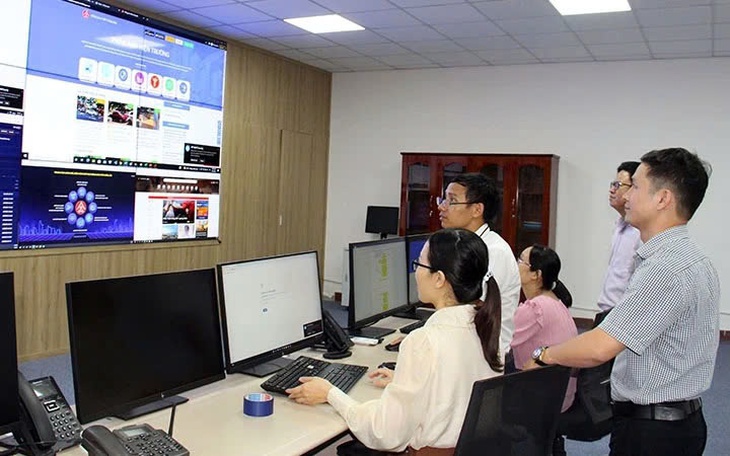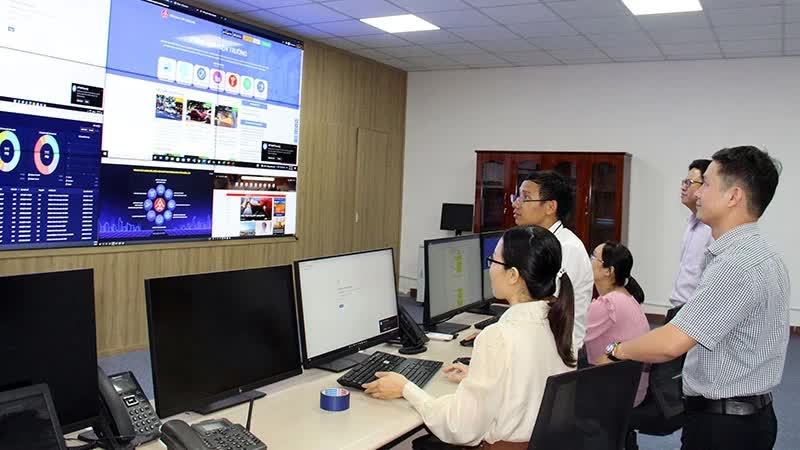

The Dak Lak Smart City Operation and Monitoring Centre staff operate the network information security monitoring system. (Photo: Kim Bao)
According to experts, digital transformation in Vietnam faces many challenges related to information security. The Department of Cyber Security and High-Tech Crime Prevention under the Ministry of Public Security said that in 2023, 14,000 ransomware attacks (malware that encrypts files or prevents users from using computers until a ransom is paid) were detected nationwide, with about 83,000 computers and servers infected with ransomware, an increase of 8.4% compared to 2022.
According to BKAV statistics, in 2023, Vietnam had 280,000 computers in agencies and organisations infected with APT malware (an increase of 55% compared to 2022). Most forms of cyber-attacks in the world have appeared in Vietnam. In the first six months of 2024, the authorities detected and handled 211,000 cyber-attack warnings and 20 serious cyber-attack incidents.
The most prominent is the data encryption attack, demanding ransom against corporations, financial, energy, and telecommunications enterprises, disrupting management and operation activities and causing great economic and reputational damage. In addition, the authorities discovered 201,903 data packages leaked on the network due to malware attacks with about 12.3 million lines of information and stolen data.
According to the Deputy Head of the Information System Security Division, the Information Security Department, the Ministry of Information and Communications Pham Tuan An, the reason for the leaking of personal information and personal data is that currently many agencies, organisations, and enterprises collect a lot of information but do not have a protection mechanism or illegally share it with third parties; leaking from data management staff; low awareness of protecting personal information and personal data. Systems collect, process, and store user information but do not ensure safety, leading to attacks and exploitation.
According to the Department of Cyber Security and High-Tech Crime Prevention, the buying and selling of citizen and internet user data in the world and Vietnam is becoming increasingly complicated in the number of cases and the amount of leaked information. Hacker groups’ attacks on network systems are carried out professionally, techniques are deployed closely, camouflaged for each other, and many are used to mislead information security departments.
Digital transformation integrates digital technology into all areas of life, economy and society, fundamentally changing how we live, work and interact. It is necessary for organisations, agencies, businesses and individuals to always be aware of and have solutions to protect information security.
Because subjects often change and update information and techniques, organisations must regularly update technology to prevent and detect it promptly. Organisations must protect customer data and ensure customers are always protected during production and business activities for the best service experience.
According to Nguyen Trong Anh from the Division of National Information Network Security Protection under the Department of Cyber Security and High-Tech Crime Prevention, for the server system, an important location that cybercriminals often target, it is necessary to focus on protecting the operating system platform with solutions such as installing a server version of the anti-malware application. They must also set up a soft firewall to screen, detect, and prevent malicious connections early, with decentralised configuration, decentralising administrative rights to each user.
For data, which is considered the “heart” of a unit, organisation, or individual, it is necessary to periodically back up data, not connect the computer or backup device to the device that is storing data; backup data needs to be encrypted and preserved, stored in a safe place.
For internet users, it is necessary to set up a strong account password, set up privacy for the account, pay attention to login notifications and security warnings, set up prevention, note when using some dangerous rights that affect personal information, including contacts, access to files, images, videos, microphones and location.
When encountering an incident in cyberspace, users need to report and contact the competent authorities; change the password and lock the compromised account; check the device and software to detect potential threats or temporarily disconnect the network; back up and protect important data, and copy and take pictures of all information, images, and data related to the incident./.


